


Greenpeace USA’s Just Recovery Agenda
A pathway to a new economy
Published: November 2020
Download: PDF
Preamble: Normal Was a Crisis
The economy we have today works for the 1%, not the 99%. The devastation wrought by COVID-19 in the United States—the death, anxiety, isolation, and instability—is the direct result of a system designed to concentrate power in the hands of a few. People are suffering and dying not only because of the virus, but because of the longstanding inequality and racism it has laid bare. This is the same system that has landed us in a climate and extinction crisis in which our very life support system—our planet—is under attack.
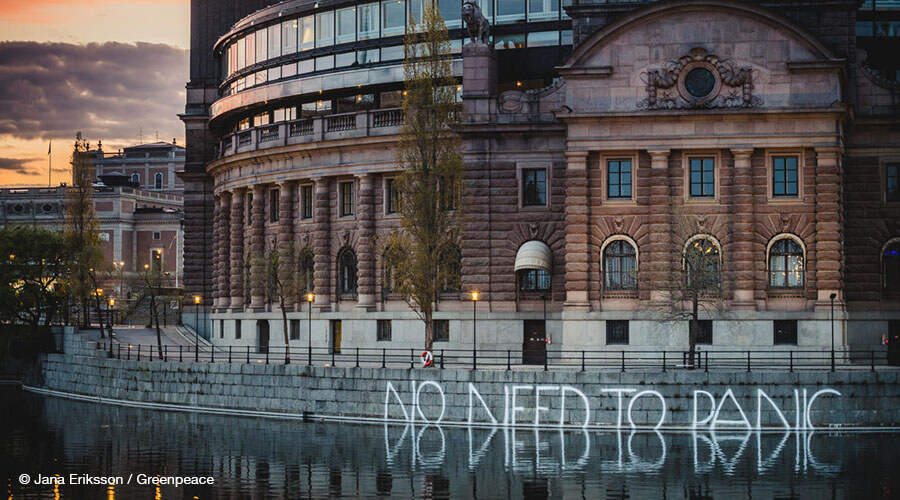

As we chart the course toward recovery, we must also confront these social, environmental, and economic injustices at their roots. The centuries-long era of racial capitalism[1]—the system under which wealthy white elites and massive corporations have controlled and exploited land, communities, and cultures to acquire power—must end.
Going back to normal is not an option. The past was not only unjust and inequitable, it was unstable. What we knew as “normal” was a crisis. We must reimagine the systems our country is built on from the ground up. We envision a world where everyone has a good life, where our fundamental needs are met, and where people everywhere have what they need to thrive.
Values for a Just Recovery
As we build a just, green, and peaceful future, we are guided by a set of deeply held, fundamental values. These values and the practices they nurture are the roots of good policy. They speak to the basic human rights and sense of community we must honor to build a world where everyone thrives. As an organization, we are committed to holding ourselves accountable to these values, to our communities, and to the scale of action that science and justice demand.
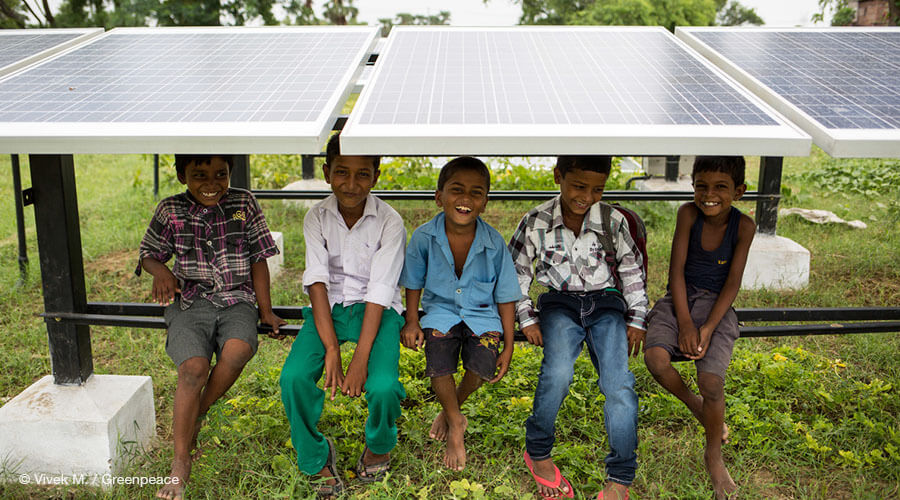

Equity. Our country can and should be a place where everyone’s fundamental needs are met. Dignified work, health care, education, housing, clean air and water, and healthy food must be guaranteed for everyone to thrive. Where we start out in society should not determine where we end up, nor should we accept a society that perpetuates rigid class stratification, racial segregation, patriarchal strutures, generational privilege, or barriers to opportunity.
Community. The strength of our society stems from the unity of purpose of its diverse people. We are all in it together as neighbors, friends, colleagues, and human beings, not as competitors or individuals. Our liberation is bound together at the local level and beyond. We embrace the value of the commons, of interconnectedness, of people power, and of global solidarity. We respect the ecological boundaries of the planet we share and upon which we all depend.


Justice. The most marginalized communities under the current system of racial capitalism—Black, Brown, Indigenous, queer, trans, working-class, women, disabled people, and more—must be centered and empowered in the transition to a new economy. We affirm that lasting peace can be achieved only by building independent power that is grounded in a commitment to restorative justice for those harmed by past and current oppressions.
Freedom. Everyone deserves to live free from oppression, want, and fear. Everyone deserves the freedom to express themselves, including participation in decisions that affect their communities, their environment, and their bodies. Full agency and self-determination for the most marginalized people in today’s society are necessary for liberation, peace, justice, and equal opportunity for all. With these freedoms come the responsibilities to listen to one another and to act to support our shared interests.
Compassion. We seek to restore power to the most marginalized and achieve accountability for past and present oppressions, not enact vengeance. We believe in and practice nonviolent resistance and movement-building. The ability to extend our compassion and solidarity across identities, borders, and social divides is essential to uncovering and healing injustice and environmental degradation.


Creativity. Our story is expansive and visionary. Our collective vision is able to hold transformational demands and inspire a movement of millions of voices telling the story of a more just and equitable future. We embrace the power of art, culture, and imagination to build community and bring our story to life.
Courage. We are rooted in what is necessary and just, not what current power structures deem possible. We boldly reject the notion that humans are innately greedy or broken, and that we are not capable of transformational change. We recognize courage as the commitment to bearing witness, confronting injustice, and practicing honesty, transparency, and truth no matter the obstacle.
We embrace the hope and optimism that come from envisioning a society built on these fundamental values, and commit to working in community toward a world in which they become the foundations of our government and economy.
Changing the Story
Putting these values into action begins with changing the story we tell ourselves about who we are as a country.
The story we’ve been told over and over again by corporate elites insists that the world they have built and now control is inevitable. They tell us that inequality is the result of individual shortcomings, not systemic failures. They offer us a false choice between a healthy economy and a healthy planet. They preach that rugged individualism, the privatization of nature, neoliberalism, and the free market hold the solutions to all of our problems. And they use racism and fear to manipulate their way into the halls of power and write the rules for society.
Their story is a lie designed to maintain their power by convincing us that the future we fight for is not possible. Our story asserts that the just, green, and peaceful future we deserve is possible and together we can build the power to manifest it.
In many ways, ours is not a new story, but is one years in the making. We strive to build on the vision and wisdom of communities on the front lines of environmental degradation and the climate crisis to ensure that we do not allow this once-in-a-generation opportunity for transformational change to pass us by.
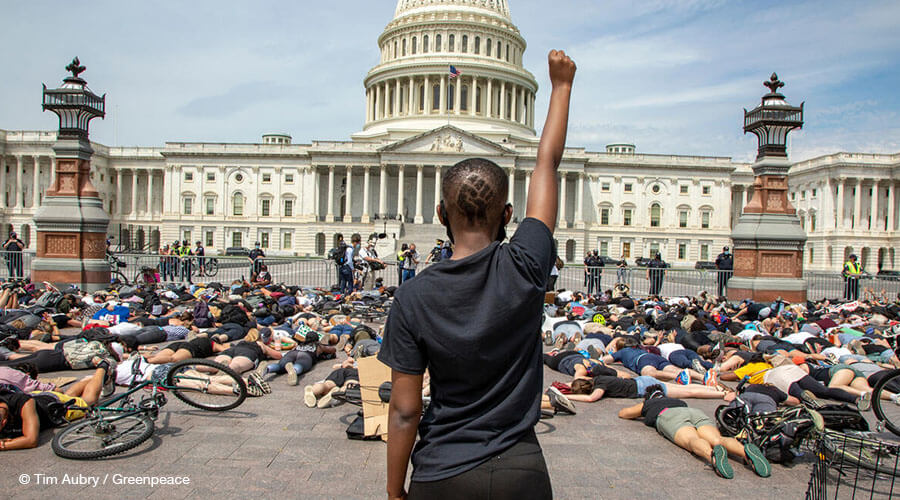

This is the story of a world in which:
- People, not corporations or wealthy elites, are at the heart of governance and public life.
The boundaries of the planet we share and upon which we depend are respected. Everyone enjoys a stable climate, intact forests, and healthy oceans. - Everyone has what they need to thrive, including dignified work, healthcare, education, housing, clean air and water, healthy food, and more. We shift from an economy that is extractive and exploitative to one that regenerates and repairs.
- The values of cooperation and interconnectedness rise above the constructs of individualism and geopolitical borders.
- We make intentional, long-term investments that benefit people and the planet.
- Our resilience to future crises is derived from the strength of our communities, the health of our planet, and robust social safety nets, not the whims of a few powerful individuals.
- The resources and opportunities stolen from those most marginalized by our current system are restored, and uncollected societal debt serves as the down payment toward self-determination and full agency for all.
Our story has no single author. Rather, it’s derived from the imagination of people around the world collectively envisioning what a better future could look like for them and their families.
Its hero is not a lone, white savior or even a single organization, but the everyday people who have protected their families and their lands for generations. It’s all of us who have cared for one another throughout the pandemic.
Our story doesn’t begin in the White House or on Wall Street, but in the homes, small businesses, schools, places of worship, tribal lands, and streets across the country where people are already organizing for justice.
Telling our story will not be the job of a single, appointed messenger, be it a politician, celebrity, CEO, or activist. That responsibility lies with everyone who believes in the vision of a better world. Together we will build a movement broad, inclusive, and powerful enough to deliver the future our communities need and deserve. Together we will rewrite the rules of society.


A Policy Agenda for a Just Recovery
Policy Principles
Health and well-being for communities
- Basic needs—including drinking water, breathable air, healthy food, and safe housing—are rights
- Quality affordable health care is guaranteed for all
- COVID-19 vaccine is free and available to everyone, everywhere
Living within planetary boundaries
- Protect clean air, water, and land
- Address the climate emergency (World beyond fossil fuels)
- Respect and honor Indigenous and local rights and knowledge
- Protect nature and biodiversity for future generations
- Transform throwaway culture, reduce waste, and produce better
- Promote ecological farming and food systems
Economic protections for people, not corporations
- Provide for a just transition and a Green New Deal
- Ensure a social safety net and provide relief directly to people
- Build an economy that cares
- Advance equitable and clean infrastructure (transportation, buildings, and energy)
- Ensure the right to dignified work
Resiliency and preventing future crises
- Prevent future zoonotic pandemics
- Be guided by science and transparency
- Prepare for climate impacts
- Clean up toxic pollution
- Advance peace and disarmament
Justice and equity across communities, generations, and borders
- Dismantle white supremacy and hatred
- Protect the most vulnerable and repay societal debts
- Transform unjust systems and institutions
- Abolish the prison-industrial complex
- Provide opportunity for all, regardless of borders, citizenship, and status
- Respect the rights of Indigenous Peoples
- Promote global solidarity and cooperation
Democratic decision-making and community control
- Create an inclusive and transparent democracy accountable to all
- Advance cooperation, mutual aid, and participation
- Provide full agency and opportunity to all to participate in governance
- Combat and correct disinformation
Balance between systemic change and immediate relief
- Address root causes of problems
- Confront false solutions
- Accept some incrementalism as a form of harm reduction
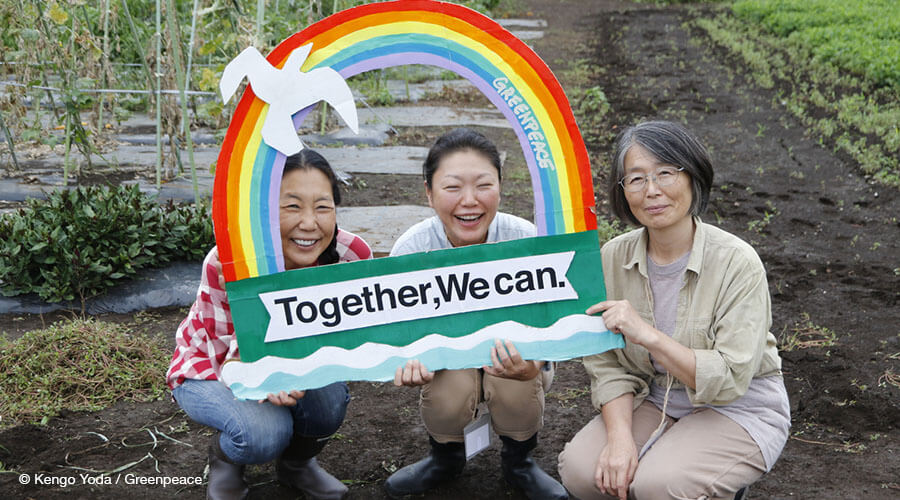

Advancing a collective vision of a just, green, and peaceful future from story to reality will require vast and sweeping change. Greenpeace USA’s Just Recovery Agenda offers a bold and transformational set of policies that policymakers must pursue to address the root causes of racial, environmental, and economic injustice. Of course, federal policy alone cannot deliver transformational, systemic change. Creating a world beyond racial capitalism will also require shifts in power, mindsets, wealth and resources, and values. The Recovery Agenda represents just one pillar of this work for Greenpeace, and we will continue to build with our allies in the movement toward a society that places people and the planet before profit and polluters.
The policy choices we make in this disruptive moment will shape the path forward for millions of people—the COVID-19 crisis and clarion call for racial justice in 2020 must mark a turning point for federal policymaking. Faced with the choice between spending the next few years cementing the status quo or delivering on the promise of an equitable economy and democracy, we know what needs to happen next. We deserve action at the scale science and justice demand. It’s time to put our elected officials to work for the people, and to use the tools and power of the federal government to solve problems rather than exacerbate them.
The following are the policy principles that shape Greenpeace USA’ s federal policy agenda for a just recovery.


Health and well-being for communities
Our communities have suffered because profit and economic growth have been prioritized ahead of people’s needs. In low-wealth and marginalized communities, particularly Black, Brown, and Indigenous communities, the impacts of the pandemic and related economic fallout have hit particularly hard, exposing the fault lines of inequality and injustice in our society. To prevent such harm, our government must ensure that high-quality, affordable health care is guaranteed, pandemic vaccines are free and equitably distributed, all communities and individuals are safe, and basic human needs—including clean water, clean air, healthy food, and safe housing—are recognized as rights.
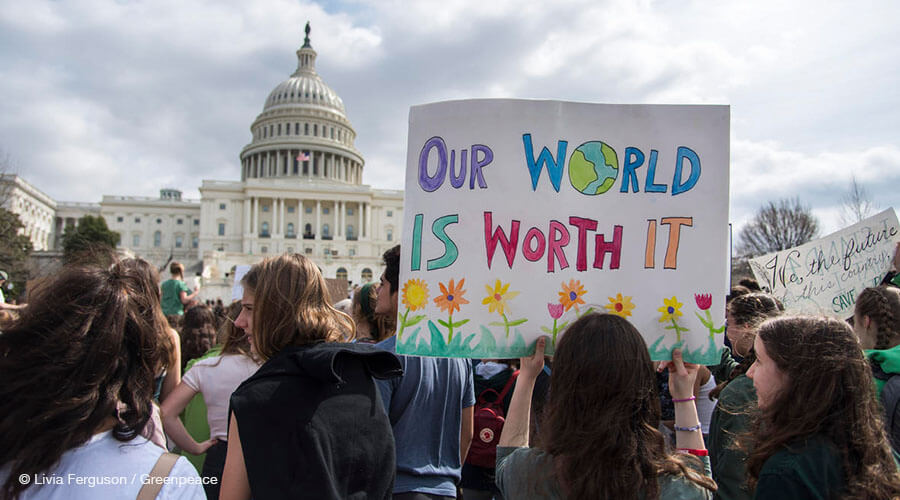

Living within planetary boundaries
We are currently extracting, producing, and consuming more than our planet can sustain. Our single-use, wasteful production systems exploit people, destroy forests, pollute oceans, damage vital ecosystems, and fuel the climate crisis.
We must rapidly move to systems based on stewardship and renewal. Clean air, clean water, and healthy land must be upheld as fundamental rights for all.
We must immediately address the climate emergency and protect ecosystems that sustain all life on our planet, while advancing a just and managed transition off fossil fuels that creates millions of dignified, union jobs for frontline workers and communities. To have a chance at limiting global warming to 1.5 degrees Celsius, the Intergovernmental Panel on Climate Change projects the world must cut carbon emissions in half by 2030 and reach net-zero emissions by 2050.[2] As the world’s largest historical cumulative emitter, the U.S. has a responsibility to reduce emissions even faster and to take action to advance climate justice around the world.
Finally, we must transform the way our food is produced and consumed by transitioning from an industrial agricultural model of production to a system where food production and consumption are based on respect for economic rights, social justice, and ecological boundaries. Methods of food production must be rooted in ecological farming to increase socioeconomic and ecological resilience.
Respecting the rights of Indigenous peoples and local communities must be central as we aim to achieve these goals.
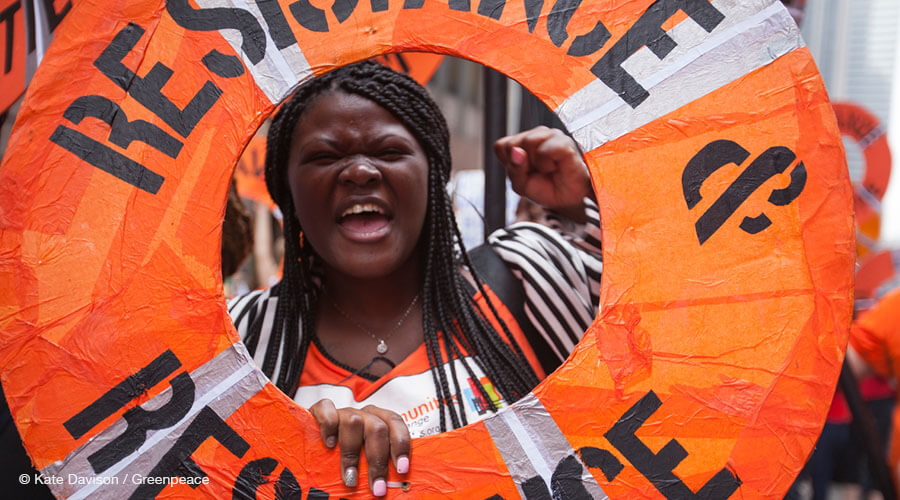

Economic protections for people, not corporations
Economic systems should be designed to best meet the needs of all people. But even as working people and families have suffered throughout the COVID-19 pandemic, corporations and billionaires have thrived. We must address this disparity by designing a new economy that ensures a social safety net and dignified work, equitably redistributes wealth, offers accessible and clean infrastructure, and provides relief directly to the people. Green New Deal–style investments—rooted in a just transition for frontline communities, as well as workers and those affected by the transition from extraction to a new economy—can bring this more equitable and resilient system to life. Eroding public support for destructive corporate entities that benefit only a wealthy few is critical to building a resilient and sustainable economy.
Resiliency and preventing future crises
The COVID-19 pandemic has exposed how our relationship to our planet can both drive and prevent crises. Keeping forests and other ecosystems intact is critical to preventing future zoonotic pandemics, which are caused when viruses jump from animals to humans, often as a result of wildlife trade or encroachment into rainforests. Recognizing and preparing for the worst impacts of climate change, including extreme weather, and cleaning up toxic exposure will protect against the worst possible impacts of future crises. We must also finally reach the conditions for lasting peace and disarmament, and continue to approach all of this work with a clear grounding in the best available science and a dedication to transparency.
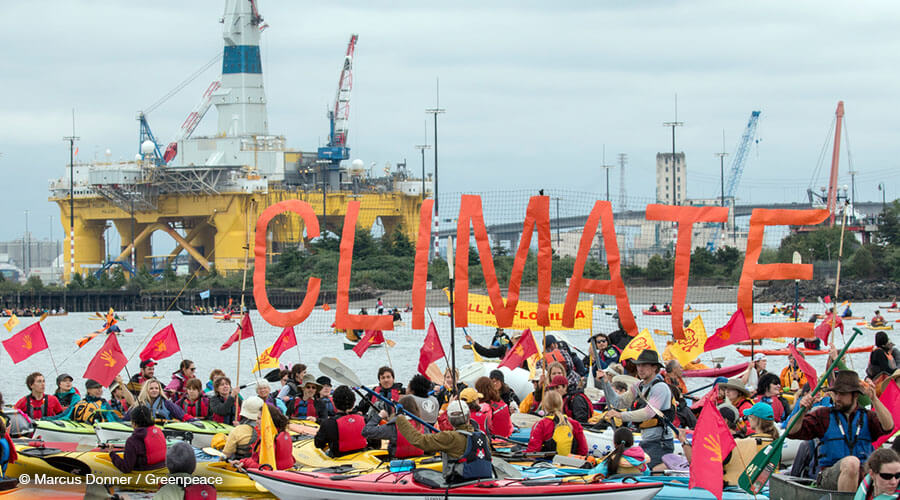

Justice and equity across communities, generations, and borders
Protecting those who have been disenfranchised while repaying historical debts—particularly to Black and Indigenous communities—and transforming unjust systems and institutions are key to creating a more equitable society. This effort includes upholding Indigenous sovereignty and making sure Indigenous lands, titles, and treaties are recognized and respected. Everyone deserves opportunity regardless of citizenship and status. Justice knows no borders. As such, pushing for a new era of global solidarity and cooperation is essential.


Democratic decision-making and community control
A better world will stem from greater inclusion, transparency, and accountability within our democratic institutions. All humans deserve to have full agency and opportunity to participate in governance and the decisions that affect their lives. A society shaped around respecting science, combating disinformation, and fostering cooperation, mutual aid, and participation can drive forward the future we fight for.
Balancing systemic change and immediate relief
For positive change to take hold throughout society, it must tackle the root causes that have created the interwoven crises we now face. Incremental change that maintains systemic inequality will never prevent future crises and will perpetuate unjust burdens on the most marginalized people. This focus on radical systemic change, however, also allows for support of nearer-term policies that offer immediate relief or protection to communities and individuals. It is only realistic to expect that any threat to the status quo will be met with not only opposition, but also false solutions masquerading as progress, such as carbon capture and storage, biofuels, biomass energy, and bioplastics. Recognizing, exposing, and confronting these false solutions are critical to progress.
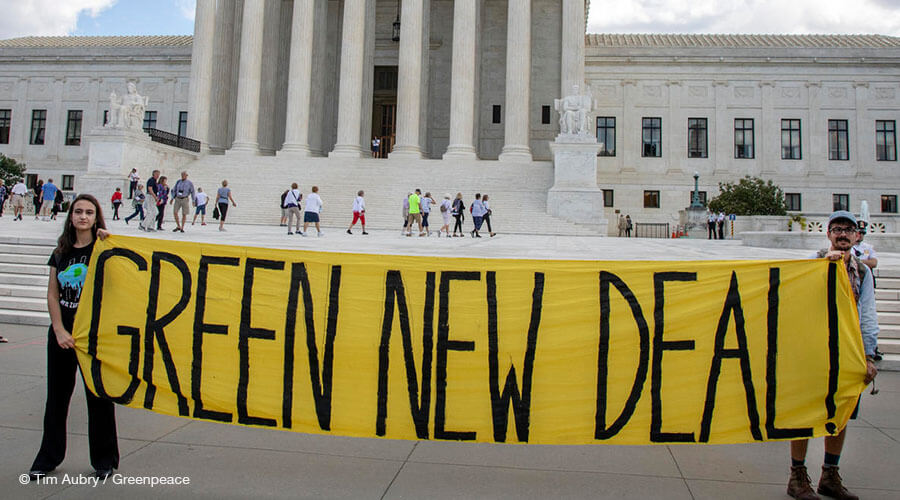

A Policy Agenda for Just Recovery
— Policies
Greenpeace USA has campaigned for decades to advance many of the policy principles that shape our call for a just recovery. Some, on the other hand, represent newer aspects of our work. The following sets of policies, while not exhaustive, represent Greenpeace USA’s priorities for federal policymakers to pursue in order to advance an economic recovery that puts people and the planet before corporate interests.
Our policy agenda is organized according to Greenpeace USA’s core campaigns to end the climate crisis, defend democracy, fight plastic pollution, protect forests, and protect the oceans. But listing them in this manner does not mean we intend to address these issues in silos. The crises of climate change, COVID-19, systemic racism, and inequality are interlocking, so our policy solutions must be, as well.
Foundations for a Just Recovery
Many of the policy solutions we advocate for a just recovery are cross-cutting by nature. They aim to shift mindsets, cultural norms, how people are treated, how our voices are heard, and how bedrock environmental laws are upheld, creating an overarching structure from which to fight for social, environmental, and economic justice.
- Honor those whose land we are on and respect the full and inherent rights of Indigenous Peoples and tribal sovereignty. Implement and uphold the International Labour Organization’s Indigenous and Tribal Peoples Convention (ILO C169) and the United Nations Declaration on the Rights of Indigenous Peoples. Recognize the right of Tribal Nations to develop and implement their own laws and protocols under the principles of Free, Prior, and Informed Consent regarding any development that impacts their health, land, water, air, territories, sacred areas, and other historically significant and cultural sites. Advance an equitable and historically appropriate process of returning public land to Indigenous control.
- Enact the Traditional Homelands Conservation Rule to ensure Indigenous Peoples always have a voice in the use and conservation of their ceded and unceded territory.[3]
- Enact the Protecting the Right to Organize Act to better enable workers to act in solidarity with one another, punish corporations that break the law, limit tactics that intimidate workers, help secure timely collective bargaining agreements, and make it easier for workers to form and join unions.[4]
- Mandate the use of project labor agreements, Davis-Bacon prevailing wage requirements, community benefit agreements, and high-road labor standards in any federally funded project.[5] Establish project, technology, and workplace standards in conjunction with unions, and base contract decisions on value—not just price—to account for climate, resiliency, equity, and job quality. Ban forced arbitration in cases of racial discrimination and sexual harrassment. Strengthen, expand, and enforce Buy American manufacturing standards.
- Establish a federal minimum wage of $15 per hour.
- Strengthen national labor and employment law protections and extend them to agricultural workers, foreign fishers, domestic workers, and other gig workers.[6] Prevent the erosion of full workplace and unionization rights for digital workers as more and more work is done remotely.
- Enact the Citizen Participation Act of 2020 to ensure federal protections are in place to establish procedures to dismiss, punish, and deter strategic lawsuits against public participation.[7]
- Mandate an absolute reduction in the production and sale of single-use products and packaging of any kind. Incentivize reuse and refill in designing packaging, alternative packaging systems, and product delivery models that support regional development and jobs.
Establish a national conservation goal with robust safeguards to conserve 30% of U.S. lands and ocean by 2030.[8] - Restore protections to downsized National Monuments including Northeast Canyons, Seamounts Marine, Bears Ears, and Grand Staircase–Escalante National Monuments.
- Strengthen the Endangered Species Act by removing economic factors from being weighted in decisions of protection and rapidly addressing the backlog of species protection petitions, including the petition for the Alexander Archipelago wolf.
- Strengthen the National Environmental Policy Act by eliminating categorical exclusions, broadening the projects covered, requiring cumulative impact and geographic scope analysis, and removing restrictions to public comments, among other improvements. Require all federally supported projects to undergo and pass a lifecycle greenhouse gas emissions test. Require meaningful consultation, including Free, Prior, and Informed Consent, and recognize the sovereignty of rights holders and leadership of impacted communities in directing all federal investments and programs.
- Mandate U.S. businesses and individuals, as well as foreign businesses offering goods or services in the U.S., conduct human rights and environmental due diligence in all of their global and domestic value and supply chains. Due diligence must include, for example, risk analysis, records of preventive measures, and ongoing monitoring of the effectiveness of such measures. Require transparency in efforts and negative impacts, and require robust action plans and public reporting on effective remediation of all identified violations throughout the value and supply chains. Establish penalties for noncompliance with the law, in addition to penalties for causing or contributing to human rights and environmental abuses in their value and supply chains.
- Enact and enforce new antitrust standards to prevent corporate monopolies and restrain corporate power, including a ban on corporate mergers that reduce the number of major firms in any sector to fewer than four. Offer the public a greater voice in reviewing mergers, and regularly investigate conditions where the same players dominate the sector for a decade or more. Review tax structures to favor increased competition and more democratic business structures. Outlaw forced arbitration and contract tying.[9]


Ending the Climate Crisis
Almost all of Greenpeace USA’s work is geared toward building a movement of people with the power to demand a wide range of fair and effective climate solutions from policymakers at all levels of government.
To tackle the heart of the climate crisis, we place particular focus on (1) phasing out fossil fuel production,(2) winning a Green New Deal, (3) advancing climate and environmental justice, and (4) supporting fossil fuel impacted workers and communities.
Managed Phaseout of Fossil Fuel Production:[10]
We must halt the expansion of fossil fuel production and all new infrastructure, and put the industry on the path for a just, equitable, and well-managed phaseout of fossil fuel production consistent with climate limits.[11] This phaseout must go hand-in-hand with investments and economic security for workers and communities affected during the transition, as outlined above. Policies to accomplish this phaseout include:
- Passing the End Polluter Welfare Act to eliminate all federal subsidies, tax breaks, loan guarantees, and financial support for fossil fuel production and prevent public money from being used to bail out fossil fuel executives and Wall Street shareholders.[12]
- Reinstating the crude oil export ban and prohibiting exports of coal and liquified fossil gas.[13]
- Banning fracking and any new fossil fuel leases on federal lands and waters, and phasing out existing leases.
- Reinstating and strengthening Environmental Protection Agency and Department of the Interior regulations to prevent methane leaks from oil and gas infrastructure.
- Rejecting federal permits for any new fossil fuel infrastructure and implementing just phaseout plans for existing infrastructure.
- Convening a National Just Transition Commission to establish national priority status for managed fossil fuel phaseout goals and to coordinate actions toward these goals.
- Supporting the establishment of minimum 2,500-foot public health and safety buffer zones to ensure that no oil and gas production occurs near where people live, work, and play.[14]
- Holding fossil fuel companies and executives accountable for misleading the public about the climate crisis and for the costs of climate impacts across the nation.
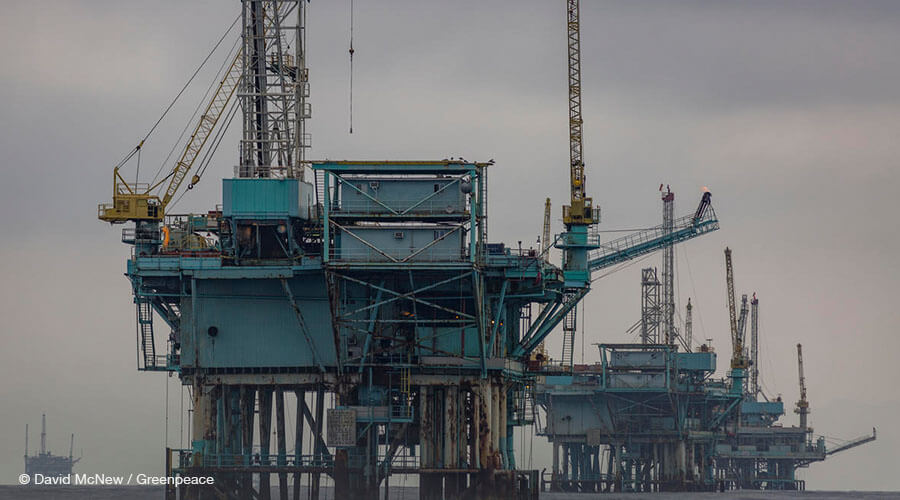

Green New Deal:
We must enact a Green New Deal that includes rigorous climate standards to keep temperature increases below 1.5°C. Trillions of dollars in public investment are needed to secure a clean energy economy and guarantee essential public goods for all people. Strong policies are essential to ensure justice and equity for Black, Brown, Indigenous, low-wealth, and other disadvantaged workers and communities. Policies to accomplish this goal include:
- Passing bold and just recovery legislation in line with the THRIVE Agenda to lay the groundwork for a Green New Deal and world beyond fossil fuels.[15] We call for the creation of a National Investment Authority, to mobilize public investments to build the future we want, and a National Employment Authority, to put people to work with guaranteed, dignified, family-sustaining jobs in the new economy.
- Setting climate standards targeting 100% renewable energy, and successfully reaching zero emissions in the power, transportation, building, industrial, agriculture, shipping, and aviation sectors as soon as possible.[16]
- Mobilizing public investments and redirecting private investments to accelerate renewable energy, clean infrastructure, ecological farming,[17] and proforestation[18] solutions to meet climate standards, coupled with policies to ensure just and equitable processes and outcomes for workers and communities.
- Establishing a Climate Justice Resiliency Fund to direct federal investments to help underresourced communities recover from and prepare for climate impacts.[19]
- Reforming the National Flood Insurance Program, the housing government-sponsored enterprises, and other housing programs and subsidies to make it easier for residents to move out of areas with high climate risk, including programs to ensure equity for low-income homeowners by repurchasing homes at market value.
- Securing the right to family-sustaining, dignified jobs, high-quality and affordable health care, healthy homes and food, good education, and clean air and water for all. We cannot address the climate crisis without addressing the interlocking crises of economic inequality, systemic racism, and global pandemics.
- Ensuring false solutions that prolong the fossil fuel era are excluded from all federal financial or other support—including nuclear power, biomass energy, blue hydrogen, carbon offset schemes, geoengineering, and carbon capture, utilization, and sequestration projects.
- Rejoining the Paris Accord and increasing the ambition of the U.S. Nationally Determined Contribution. Re-engaging with the United Nations Framework Convention on Climate Change and leading the way toward truly just and equitable global climate action.
Environmental Justice:
We must end environmental racism and reverse the legacies of past injustice by placing both resources and power in the hands of impacted communities. Policies to accomplish this vision include:
- Combating environmental injustice and ensuring healthy lives for all, including Black, Brown, Indigenous, and low-wealth communities, by mandating that at least 40% of climate and green recovery investments benefit disadvantaged communities and requiring all federal projects to pass a rigorous equity and environmental justice screen.
- Passing the Environmental Justice for All Act to provide legal remedies to citizens, improve equity mapping tools, expand grant programs, and strengthen consultation with impacted communities.[20]
- Establishing rules to reduce pollution and pollution disparities by implementing a No Hotspots Policy and mandating assessment and mitigation of cumulative risks.[21]
- Elevating environmental justice to the highest levels of governance, including by passing the Climate Equity Act[22] and establishing environmental justice bodies that hold the Executive Branch accountable and ensure that all federal legislation, grants, and regulations pass an equity and environmental justice screen, and that representatives of environmental justice communities lead the development and implementation of such policies.
- Strengthening the National Ambient Air Quality Standards to align with the best available science, restoring the integrity of the Clean Air Scientific Advisory Committee, revoking the Environmental Protection Agency’s “secret science” rule, and ending the politicization of air pollution at the EPA.
- Enacting stronger standards, monitoring, and enforcement for hazardous air pollutants under the Clean Air Act.
Support Workers and Communities:
We must ensure that workers and communities will be better off during the transition to a more just and regenerative economy. We must invest in economic security and opportunities for workers and communities affected by the transition, including guaranteeing wage parity and benefits, and investing in community tax base replacement and regional economic development. Policies to realize this support include:
- Investing in long-term economic security for energy workers, families, and communities by creating a national Energy Worker and Community Protection Fund.[23] This fund will provide wage and benefit guarantees, transition assistance, and community tax base replacement, revitalization, and economic diversification directly to impacted workers and communities during the energy transition.
- Requiring fossil fuel companies to keep their promises and pay their debts to workers, families, and communities, and pay their fair share to support them during the COVID-19 crisis and through the energy transition.
- Enacting legislation to make it easier to form and join unions and ensure high-road labor standards for all workers, including agreements to incentivize preferential hire for workers who have been displaced during the decline of the coal, oil, and gas industries.
- Forming a National Just Transition Commission to guide the development and implementation of the overall fossil fuel transition strategy and establish task forces to recommend policies and programs appropriate to specific regions and sectors that are heavily dependent upon fossil fuel production and use.[24]
- Creating a Federal Just Transition Office to research and coordinate local, regional, and sector-specific fossil fuel phaseout programs and policies.
- Providing good jobs cleaning up orphaned and idle oil and gas wells and abandoned mines, and strengthening bonding and leasing policies to ensure that no oil or gas well will become orphaned in the future. Where possible, prioritizing the use of local hire agreements and resourcing these new jobs following the “polluter pays” principle.[25]
- Establishing new and strengthening existing regional development programs to support community-designed economic revitalization, job training, education, economic diversification, and small business development in fossil fuel–dependent communities.
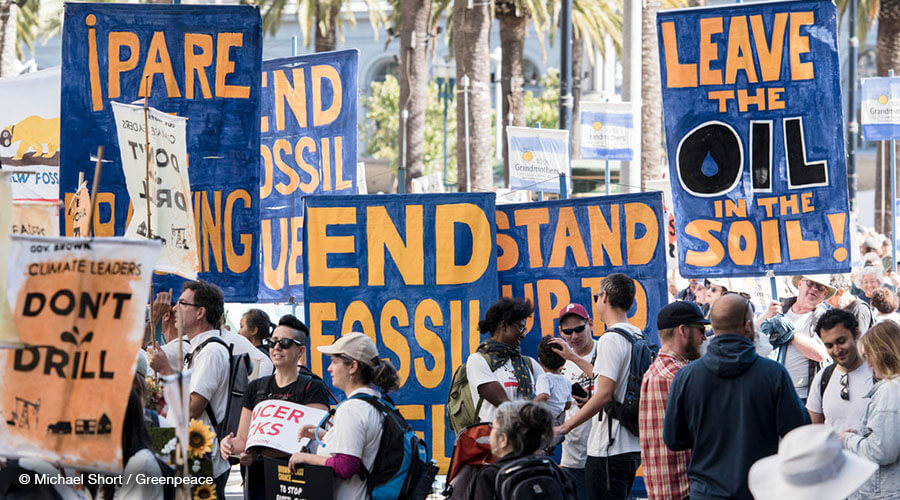

Defending Democracy
Our democracy is in peril. We must protect people’s rights to have a voice in the democratic process, get corporate money out of politics, defend the fundamental right to protest, and transform the current system to a people-powered democracy that works for all. Policies to achieve this vision include:
- Enacting the For The People Act of 2019 to expand voting rights, limit partisan gerrymandering, strengthen ethics rules, and limit the influence of private money in politics.[26]
- Passing a constitutional amendment to overturn the Citizens United Supreme Court ruling giving corporations and the fossil fuel industry unprecedented access to influence elected officials.[27]
- Enacting the Voting Rights Restoration Act to eliminate laws and practices that disenfranchise returning citizens and discriminate against people of color and language minorities.[28]
- Enacting a nationwide “Ban the Box” law requiring employers to remove criminal-history questions from employment applications.[29]
- Establishing mandatory independent and advisory redistricting commissions to ensure the power to draw districts lies with ordinary Americans, not legislators. Forcing an end to gerrymandering.
- Passing a constitutional amendment to abolish the electoral college and establish the national popular vote as the mechanism for electing the U.S. President.
- Enacting the Washington, D.C. Admission Act to establish the State of Washington, Douglass Commonwealth as the 51st state, on an equal footing with the other states.[30]
- Enacting the Restore the Fairness Doctrine Act of 2019 to reinstate the obligation of broadcast licensees to afford reasonable opportunity for the discussion of conflicting views on issues of importance to the public.[31]Enacting The BREATHE Act to police brutality and racial injustice by investing in Black communities and re-imagining community safety.[32]
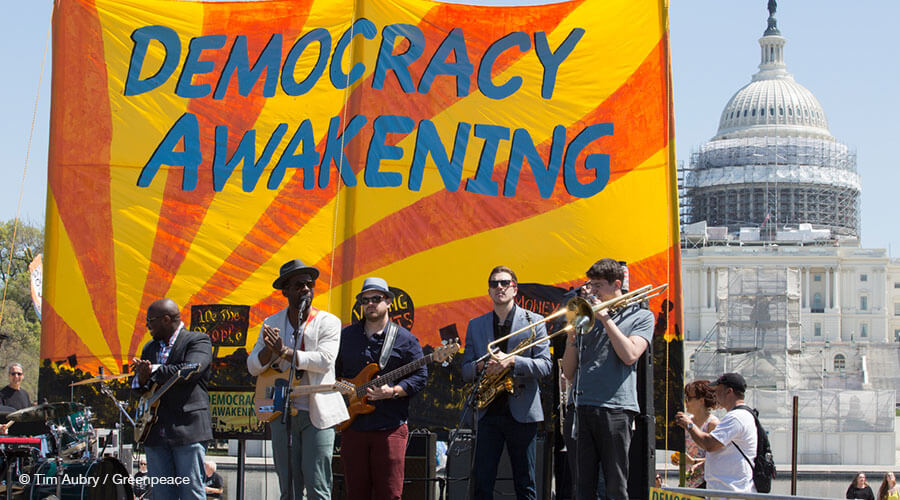

Fighting Plastic Pollution
Plastic pollution is a global crisis. This toxic material collects in our oceans and waterways, chokes marine life, contaminates our bodies, and is found at the farthest reaches of the planet—even in the air we breathe. But plastic is not just an ocean and waste problem; it is also a climate, health, and environmental justice problem. Ninety-nine percent of all plastic is made from fossil fuels, and plastic contributes to climate change throughout its entire life cycle. Plastic production has devastating impacts on people living near petrochemical plants and fracking sites, particularly harming low-income and marginalized communities. We must stop plastic pollution at the source and ensure companies take responsibility for the full life cycle of their packaging. The policies needed to achieve this goal include:
- Enacting the Break Free From Plastic Pollution Act.[33]
- Suspending and denying permits for new and expanded plastic production facilities, associated infrastructure projects, and exports.
- Requiring producers of packaging, containers, and food-service products to design, manage, and finance waste and recycling programs, while avoiding false solutions like “chemical” recycling and replacing single-use plastic with another disposable material.
- Prioritizing public investment in zero-waste systems, including compost, reuse, and mechanical recycling to avoid landfill development and waste-to-energy/incineration projects. Prioritizing resources for publicly owned and worker cooperative zero-waste companies.Prohibiting the U.S. export of plastic and electronic waste without the consent of inbound countries.


Protecting Forests: Nature, People, and Climate
U.S. Forests and Biomass Energy:
We must transform the way our forests are valued, treated, and protected, to maximize their role in stabilizing our climate, supporting biodiversity, and serving cultural purposes. Policies to accomplish this transformation include:
- Banning all commercial old-growth and roadless forest logging on public lands, and implementing a no-net-loss policy for all U.S. forestlands. Funding a just transition for impacted workers and communities.
- Establishing a moratorium on all commercial logging on all public lands to prioritize the restoration of ecosystems and watersheds.
Decoupling U.S. Forest Service and state public land agencies’ funding from logging and other exploitative uses. - Enacting the Roadless Area Conservation Act to codify protections to the millions of acres of roadless U.S. forestland.[34]
- Establishing a new protected area designation for federal land—Forest-Carbon Reserves—aimed at achieving meaningful, measurable, and verifiable carbon storage targets outside of existing international Land Use, Land-Use Change and Forestry accounting structures.
Developing a tax-and-reward program for forest carbon. - Eliminating all federal financial support and taxpayer subsidies for new and existing sawmills and biomass energy facilities, as well as for biogas and biomethane production.
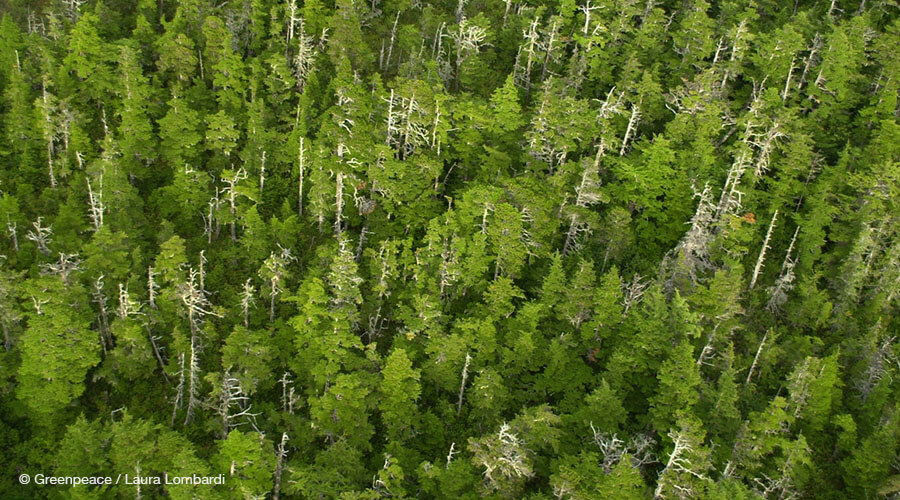

Meat, Dairy, and Ecological Farming:
We must transition from a food system based on industrial agriculture toward a system where food production and consumption are grounded within ecological limits and based on respect for economic rights, social justice, and food sovereignty. Methods of production must be rooted in Ecological Farming to increase socioeconomic and ecological resilience.[35] Policies to facilitate this transition include:
- Banning new and expansions to existing factory farms and confined animal feeding operations. Strengthening regulations and enforcement and closing loopholes and exemptions in four critical laws that allow industry to operate with impunity, including in the Clean Air Act, Clean Water Act, Comprehensive Environmental Response, Compensation, and Liability Act, and Emergency Planning and Community Right-to-Know Act.
Empowering the U.S. Department of Justice and the Environmental Protection Agency to enforce the “polluter pays” principle and the environmental and climate liability of industrial farms, processing facilities, and agribusiness for waste and nitrate runoff that creates dead zones in rivers, deltas, and Gulf waters. - Ending subsidies and policies that support industrial meat and dairy products. Cutting public spending on industrial meat and dairy products while increasing economic support for local ecological farmers, and promoting fruits and vegetables sourced from local ecological farmers.
- Requiring public authorities to quickly adopt mandatory procurement policies for bulk purchases of more plant-based, less carbon-intensive, and more ecologically farmed food from U.S. producers. Implementing procurement policies for public cafetaries, schools, federal agencies, and the U.S. military with an explicit aim to reduce meat and dairy consumption by 70% by 2030.
- Establishing mandatory targets for greenhouse gas emission reductions for the animal agriculture sector based on a transparent comprehensive production and consumption life-cycle assessment approach.
- Creating an Ecological Farming Policy with a timed implementation plan. Providing enabling tools to support the transition of small-scale farmers and address barriers for young, Black, Indigenous, and people of color (immigrants and U.S. born) to thrive as food producers.
Increasing investments in and shifting agricultural finance to scale up Ecological Farming. - Mandating improved working conditions, pay, and protections for all food chain workers and ensuring workers’ right to organize. Ending the exploitation of incarcerated people for food production. Strengthening workplace standards and enforcement practices, including the Agricultural Worker Protection Standard.[36]
Global Deforestation, Forest Degradation, and Conversion of Natural Ecosystems:
We must prioritize protecting globally significant ecosystems, biodiversity, and the rights of Indigenous Peoples and traditional communities, to address the ecological breakdown the world faces. Extractive industries and the commodities trade remain key drivers of deforestation worldwide and are a threat to a safe climate and to the future of the planet. Policies to accomplish these protections include:
- Banning the importation of any commodity linked to deforestation or any product produced with commodities linked to deforestation.
- Mandating the public availability of supply chain data for any imported forest-risk commodity or product produced with forest-risk commodities.[37] Requiring that data is verifiable and provides traceability to point of origin, with maps of landholdings, and disclosure of ultimate ownership.
- Establishing procurement policies for all public purchases of products made with forest-risk commodities, ensuring that the purchases are free of ecosystem destruction or human rights abuses and requiring traceability to the point of origin.[38]
- Adopting deforestation safeguards and incentives in foreign policy and multilateral conservation funding, with robust protections for Indigenous and human rights.
- Funding multilateral performance-based conservation agreements, with robust safeguards for local communities’ and Indigenous Peoples’ rights in accordance with the UN Declaration on the Rights of Indigenous Peoples.[39]
- Enacting strict deforestation, human rights, and sustainability requirements and safeguards into public, multilateral, and private financial institutions’ lending and other financial business practices.[40] Adopting strict U.S. Securities and Exchange Commission mandatory disclosure and environmental liability reporting to include deforestation.
- Eliminating all federal financial support and taxpayer subsidies for any biofuels, unless the best available science proves that the feedstock and its production does not worsen climate change, is not detrimental to biodiversity, maintains or enhances soil fertility and carbon stocks, and avoids competition with food, feed, and materials production.[41]
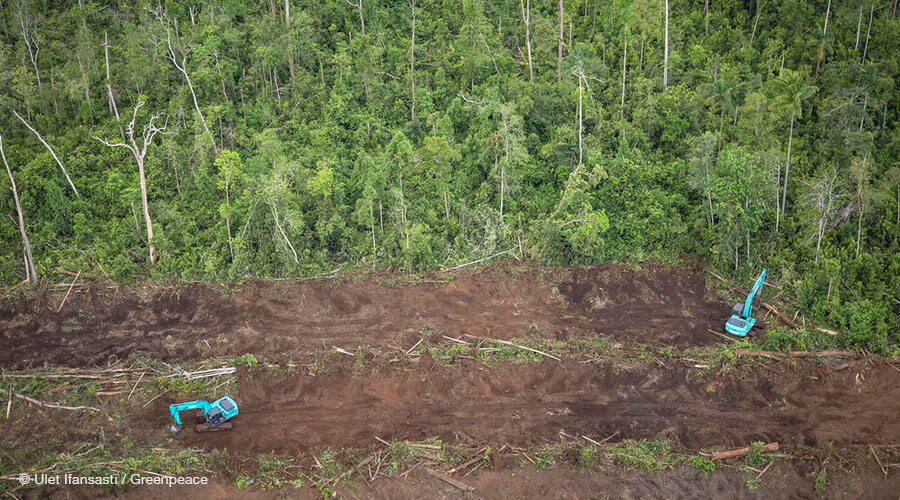

Wildfire Risk Reduction and Adaptation:
We must reduce the risk that wildland fires pose to humans and communities in a way that is just and equitable, while transitioning wildland management from ecologically destructive, ineffective, and costly fire suppression. Policies to accomplish this goal include:
- Establishing reliable and recurring funding for noncommercial vegetative management in wildland–urban interface zones and directing the U.S. Forest Service to update its policy on prescribed burning to be in line with the best available science and Indigenous knowledge.
- Establishing a federal mandate that local municipalities amend building codes to include and enforce proven fire safety home-hardening elements, such as vent and chimney screens and noncombustible building materials. Providing funding to assist in retrofits of existing homes with a focus on marginalized communities.
- Federally requiring all community buildings to be equipped with state-of-the-art air filtrations systems and function as smoke shelters when wildfires or other events cause local air pollution to reach unhealthy levels.
- Federally requiring all utility companies to properly and equitably upgrade and maintain grid infrastructure, including power lines across the country, with priority to high-fire-risk areas, and discourage the use of blackouts as a fire-risk-reduction measure.[42]
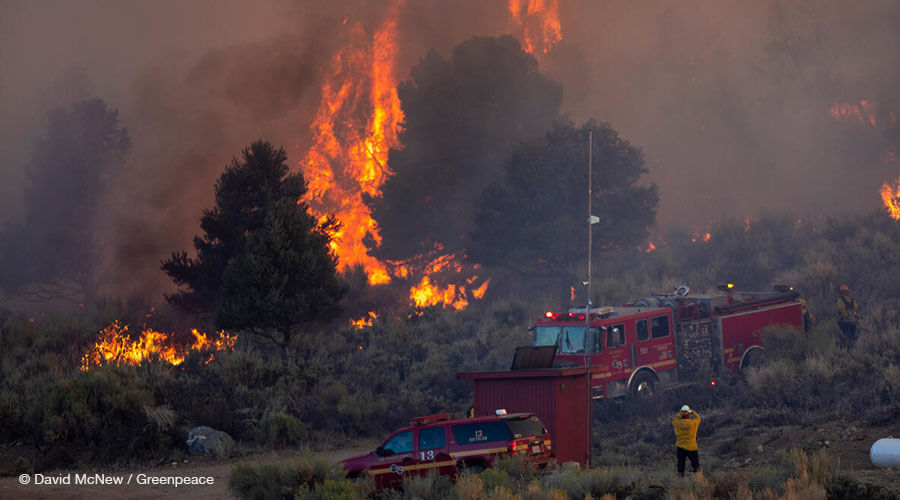

Protecting the Oceans
Global Network of Ocean Sanctuaries:
Marine scientists tell us that to prevent extinction, ecosystem collapse in the oceans, and further climate breakdown, we must protect at least 30% of the world’s oceans by 2030 in fully protected ocean sanctuaries (30×30).[43] To reach 30% coverage, it is necessary to protect vulnerable ecosystems and species in areas beyond national jurisdiction (ABNJ), which cover two-thirds of the planet’s oceans. However, the world currently lacks a legal mechanism to enact such protection in most ABNJs. Securing a strong Global Ocean Treaty would provide this much-needed governance framework. However, the treaty alone will not establish the 30% protection we are seeking. Policies to achieve this protection include:
- Supporting the formation of (and later signing and ratifying) a strong Global Ocean Treaty (BBNJ [biodiversity beyond national jurisdiction] Instrument) under the UN Convention on the Law of the Sea,[44] empowered with a centralized decision-making body (preferably a Conference of the Parties) with authority to establish and implement high-seas ocean sanctuaries with effective management measures.[45]
- Ratifying the Convention on Biological Diversity (CBD).[46] The U.S. is currently one of only two UN member states that are not a party to the CBD. The CBD is critical to establishing protections for at least 30% of the world’s oceans, whereas the Global Ocean Treaty will be the legal mechanism to implement that goal in ABNJs.
- Supporting the U.S. entering the Global Ocean Alliance[47] and High Ambition Coalition[48] countries in advocating 30×30 as a shared global goal in the CBD, post-2020 biodiversity framework.[49]
- Supporting the Udall-Bennet Thirty by Thirty Resolution to Save Nature[50] and complementary House resolution[51]—to protect 30% of U.S. ocean waters by 2030.
- Protecting the integrity of our national network of marine monuments, including restoring protections to the Northeast Canyons and Seamounts Marine National Monument.[52]
- Ratifying the UN Convention on the Law of the Sea.[53]
- Supporting the creation of sanctuaries in ABNJs of particular interest to the U.S., including the Arctic Ocean, the Sargasso Sea,[54] the middle north Pacific (White Shark Café)[55] and full protection of the Weddell Sea off Antarctica via the Commission on the Conservation of Antarctic Marine Living Resources.[56]
- Enacting a ban on deep sea mining[57] in both domestic and international policy by ending authorizations for existing activities, eliminating subsidies for deep seabed mining research, exploration, and exploitation activities, and ending the development of the Mining Code under the International Seabed Authority.[58]
Ocean Climate Action:
The ocean and its enormous blue economy were overlooked in early conceptualizations of the Green New Deal. The Blue New Deal was introduced by those seeking to correct course on this oversight.[59] Regardless of the form, we must harness the enormous capacity of the ocean to mitigate climate change, provide renewable energy, and create a magnitude of clean, climate-friendly, and good union jobs. Policies to advance this effort include:
- Supporting the Ocean-Based Climate Solutions Act of 2020 to leverage the ocean’s potential in the fight against climate change by promoting offshore renewable energy, protecting blue carbon, supporting climate-ready fisheries, expanding marine protected areas, improving ocean health, and more.[60]
- Supporting the completion of the Green New Deal with the addition of tenets of the Blue New Deal,[61] including:
- Expanding offshore renewable energy.
- Ending offshore drilling.
- Building climate-ready fisheries.
- Investing in regenerative ocean farming.
- Building climate-smart ports.
- Restoring coastal and marine ecosystems.
- Holding industrial agriculture accountable for upstream pollution.
- Adapting for climate change via pre- and post-disaster mitigation.
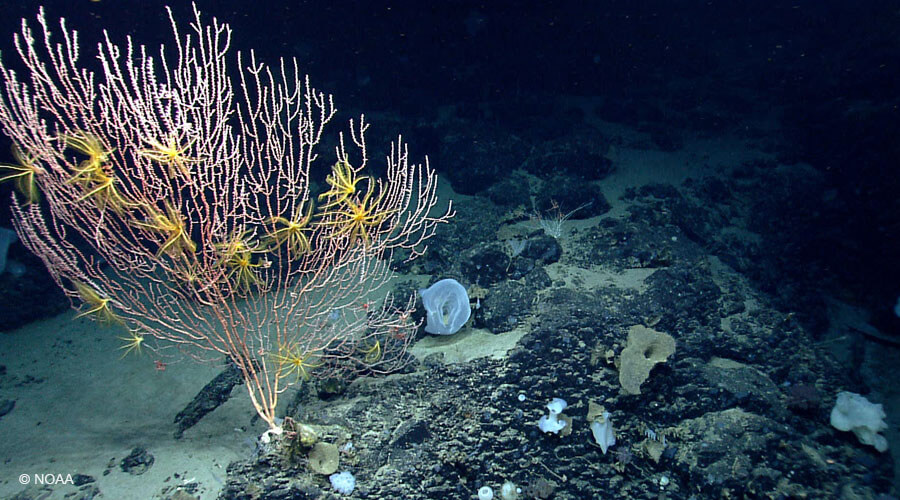

Sustainable and Socially Just Fisheries:
We must substantially transform fisheries production dominated by large-scale, socially and economically unjust, and environmentally destructive methods.[62] Instead, smaller-scale, community-based, labor-intensive fisheries using ecologically responsible, selective fishing technology and environmentally sound practices must be our future. International trade in fisheries products must not undermine the legitimate interests of coastal communities, which include protecting fisherfolk’s livelihoods and human and labor rights against practices that negatively impact food security, especially in developing countries. Policies to achieve this vision include:
- Mandating all fish and invertebrate stocks to be sustainably managed, ensuring recovery of depleted species, and implementing safeguards for fishing impacts on threatened species and vulnerable ecosystems.
- Sustainably managing all fish and invertebrate stocks and aquatic plants legally, and applying ecosystem-based approaches so that overfishing is avoided, recovery plans and measures are in place for all depleted species, fisheries have no significant adverse impacts on threatened species and vulnerable ecosystems, and the impacts of fisheries on stocks, species, and ecosystems are within safe ecological limits.
- Strengthening the U.S. Seafood Import Monitoring Program by expanding the scope to cover all species, requiring key labor market information data elements and more key comprehensive conservation-related data elements, and requiring “bait to plate” traceability.[63]
- Redefining illegal, unreported, and unregulated fishing (IUU) to include violations of national and international human rights and labor standards.[64]
- Requiring U.S. importers sourcing from countries or areas on the U.S. Department of Labor List of Goods Produced by Child Labor or Forced Labor to provide clear and convincing evidence, including verifiable third-party reports, that the seafood imported was not produced by forced labor in violation of the U.S. Tariff Act.[65]


Advancing Cross-Movement Solutions for People and the Planet
Reversing the damage wrought by centuries of racial capitalism will take an inclusive, people-powered movement working in solidarity. Greenpeace USA has campaigned for decades to protect biodiversity, confront corporate wrongdoing, and bear witness to power, but our historical core campaigns alone will not be enough to advance a just recovery. The progressive movement is broad, diverse, and growing more powerful with each day. While there is no way we could list every one of the courageous organizations in the fight for a just recovery, we elevate the following platforms and policies as some, among many, that are critical to achieving our collective vision for an economy and democracy that work for everyone.
Justice
- We support the Movement for Black Lives Policy Platform[66] and the BREATHE Act,[67] including the focus on ending the war on Black people, gaining community control, and securing economic justice for all people. We support the prioritization of efforts to abolish the prison industrial complex, including the elimination of federal programs and agencies used to finance and expand the U.S. criminal-legal system and to direct changes to the federal criminal-legal system, including changes to the policing, prosecution, sentencing, and jailing practices. We also support the funding of federal grant programs that incentivize decarceration and subsidize nonpunitive, community-led approaches to public safety. And we explicitly support abolishing the practice of militarizing the police, ending all transfers of equipment from the Pentagon to police departments.
- We support the National Coalition of Blacks for Reparations in America and efforts toward establishing pathways to use federal funding to repair, reconcile, and move forward through transformative justice processes that are legal and equitable remedies to heal communities spiritually, physically, and economically.[68]
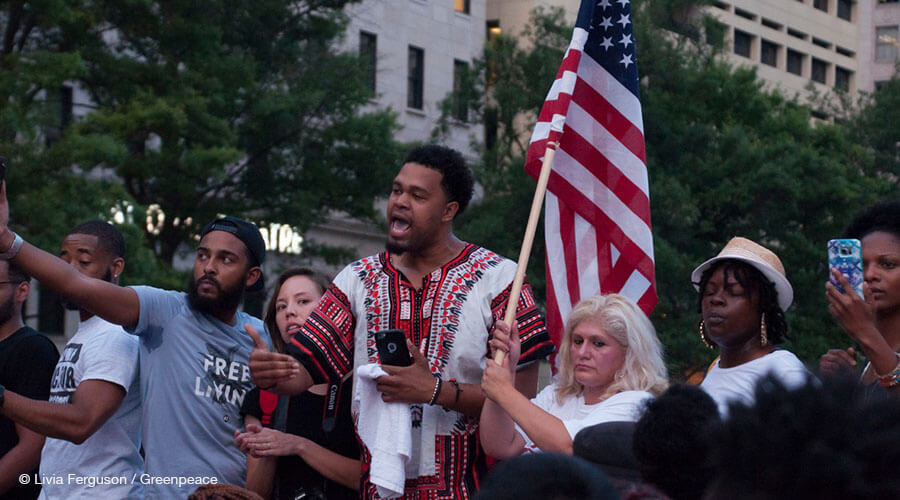

Rights of Indigenous Peoples and Human Rights
- We support the United Nations Declaration on the Rights of Indigenous Peoples, including the specific rights to self-determination, freedom, peace and security, as individuals and collectively for recognized and unrecognized Native American tribes and nations. Fulfilling the United States’ trust and treaty obligations and ensuring Free, Prior and Informed Consent for all decisions that affect them, including any project on their traditional territories, is critical to ensuring Tribal Nations and Indigenous communities thrive.
- We support organizations, such as NDN Collective,[69] Honor the Earth,[70] and Indigenous Environmental Network,[71] working to establish federal funding to support, build, preserve, and restore cultural assets and sacred sites, preserve tribal existence, and protect tribal natural resources.
- We support Earthrights International’s platform for stronger U.S. policy on human rights defenders,[72] including specific actions the federal government can take to mitigate reprisals against human rights and specifically environmental and land rights defenders, including fishery observers.[73]
- We support efforts to protect the human and immigration rights of people forced to migrate as a result of climate impacts and disasters. These efforts include incorporating climate change into immigration policy, recognizing climate disruption as a credible fear for refugee and asylum cases, and supporting vulnerable nations through adaptation and resilience funding.
- We support the National Immigration Law Center,[74] National Partnership for New Americans’ New American Dreams Platform,[75] and United We Dream,[76] among others, working toward comprehensive reforms to the U.S. immigration system, including forging paths to citizenship, providing asylum and employment protections, dismantling cruel deportation and detainment, and reshaping enforcement by breaking up U.S. Immigration and Customs Enforcement and U.S. Customs and Border Protection.
Health Care and Pandemic Response
- We support organizations, like Public Citizen,[77] National Nurses United,[78] and the AFL-CIO,[79] that work to ensure health care is affordable and accessible for all.
- We support the COVID-19: Principles for Global Access, Innovation and Cooperation[80] and the more than 140 world leaders and experts calling on all governments to unite behind a people’s vaccine for COVID-19—available to all, in all countries, free of charge.[81]
- We support People’s Pandemic Prevention Plan including among its wide and ambitious calls for change – its call for the launch of a new federal program to create thousands of new union jobs to meet the needs for contact tracing, testing, vaccinations, and support with long term focus on addressing other health disparities that disproportionately impact disadvantaged communities.[82]
- We support the #ExtinctionEndsHere[83] and #EndtheTrade[84] coalition work to end the exploitation of wildlife and wildlife habitats that increases our exposure to pathogens. This includes restrictions on wildlife trade and wet markets via locally adapted programs with local communities, respecting their rights to food and food sovereignty. Support for the transition of workers and communities where needed is also critical.
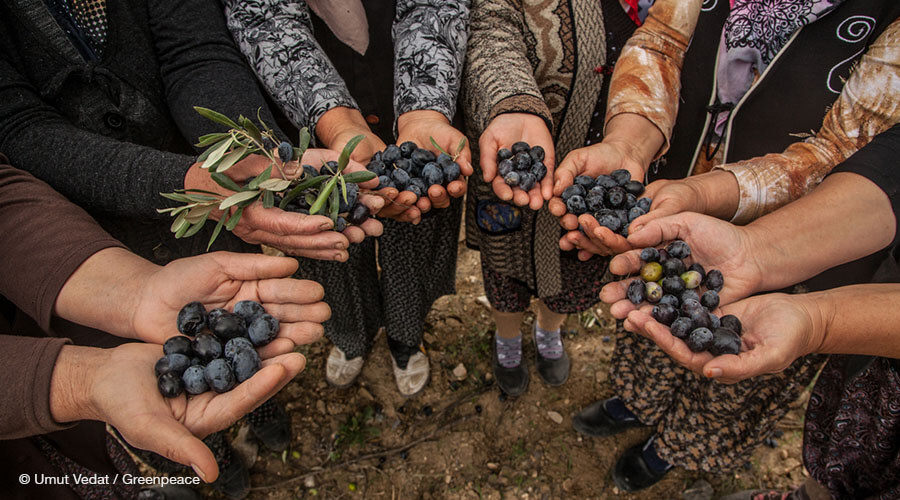

Environmental Justice
- We support the Environmental Justice Health Alliance,[85] Gulf Coast Center for Law & Policy,[86] TEJAS,[87] California Environmental Justice Alliance,[88] WE ACT,[89] and APEN,[90] among so many others, working to address environmental and public health disparities.
- We support Demos’ Frontlines Climate Justice Executive Action Platform including the formal establishment of a Climate Equity Accountability System, a consistent equity rubric in the Community Development Block Grant Disaster Recovery Program and addressing pollution disparities.[91]
Livable Conditions
- We support the Clean Water for All agenda,[92] as well as the recommendations that a broad spectrum of environmental, frontline, public health, and other groups made to Congress to create a clear, time-bound plan for ensuring that all communities have public access to safe, clean water.[93] Federal investments and job creation in public water systems are desperately needed to improve drinking water infrastructure, including replacing all lead pipes nationwide.
- We support Clean Production Action,[94] Coming Clean[95] and the International Pollutants Elimination Network[96] and all the work they and others are doing to eliminate the use and emission of hazardous, toxic, persistent, and bioaccumulative chemicals, including polyfluoroalkyl substances, glyphosate, chlorpyrifos, neonicotinoids, and dicamba, among others. It is critical that the U.S. adopt cleaner production processes, enact safety regulations, require substitutions with safer chemicals, redesign products and systems, require manufacturers to provide comprehensive safety data for all chemicals, and establish a publicly accessible inventory of the toxicity of all chemicals.
- We support the National Low Income Housing Coalition[97] and the American Housing and Economic Mobility Act of 2019.[98] Funding the National Housing Trust Fund, providing resources for federal affordable housing programs, and ensuring federal that disaster recovery efforts are fair and equitable and that access to affordable housing is equitable are all critical to addressing historic patterns of discrimination and ensuring all people have access to safe housing. Enacting environmentally just building policies and standards aligned with the Green New Deal and establishing urban green space minimums and urban redevelopment and remediation of contaminated land will further ensure safe and healthy housing.[99]
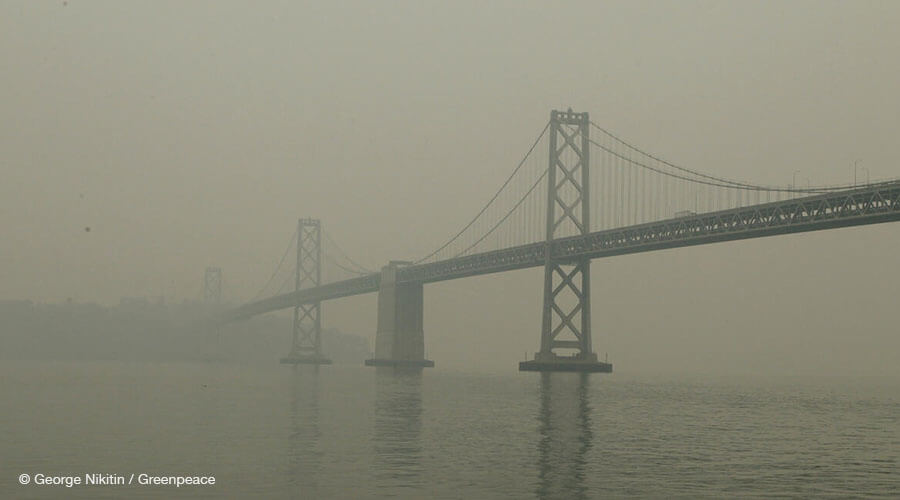

Social Safety Net
- We support efforts to protect and strengthen U.S. social services, including unemployment benefits, Earned Income Tax Credit, Supplemental Nutrition Assistance Program, Supplemental Security Income, Temporary Assistance for Needy Families Program, Special Supplemental Nutrition Program for Women, Infants, and Children, and the Low Income Home Energy Assistance Program.
- We support efforts to establish federally mandated paid parental and sick leave for all workers.
- We support efforts to expand child care for working families, relieve student debt, and manage and fund a U.S. pilot program for universal basic income.[100]
Food Systems
- We support the National Family Farm Coalition,[101] the HEAL Food Alliance Platform for Real Food,[102] and others working to support family farms and ensure healthy food is available to all through robust policies focused on healthy, accessible, and affordable food and farm systems. We also support creating support for farmers of color and Indigenous farmers whose land has been systematically taken from them.
- We support food justice, labor, farming, and animal welfare organizations that are demanding investment in food workers, farmers, and local communities in response to the global pandemic.[103]
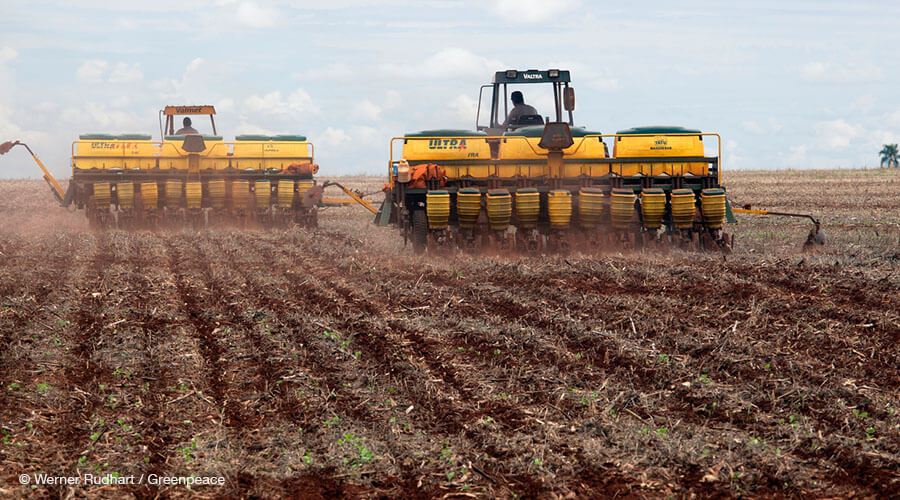

Infrastructure
- We support efforts toward recognizing fast, affordable broadband access as an essential right, and providing infrastructure grants and technical assistance to build resilient, affordable, equitable high-speed broadband infrastructure in underserved areas of the country with labor protections for those building and servicing infrastructure.
- We support the Battle for the Network Coalition and the push to ensure equitable and affordable access to the internet and protections for net neutrality to ensure companies do not censor, slow down, or block websites while requiring other sites to pay for faster service.[104]
Corporate Accountability
- We support Americans for Tax Fairness and the principle that corporations and the wealthiest should provide a greater share of federal revenue to reduce inequality and to meet America’s growing needs.[105]
- We support efforts to mandate that strict conditions be placed on all government cash grants, tax breaks, loans, and central bank bond purchases to ensure corporations meet national and international targets as well as best practices.
- This could include but is not limited to (1) having a plan for 100% renewable energy by 2030; (2) paying a living wage; (3) having workers select 40% of corporate board seats; (4) limiting executive bonuses; (5) actively enacting guidelines to address environmental and human rights noncompliance in supply chains, including thresholds to determine the status of sourcing and suspension or termination of noncompliant suppliers, in line with the UN Guiding Principles on Business on Human Rights; (6) having a plan to reduce the production and sale of single-use plastic and transition to innovative alternative packaging systems and product delivery models; and (7) eliminating frivolous lawsuits, including Strategic Lawsuits against Public Participation.
- We support the Accountable Capitalism Act and other efforts to require large corporations to obtain a federal charter that obligates directors to consider interests beyond shareholder value, empowers workers to elect at least 40% of board seats, restricts equity compensation, and mandates 75% approval for political expenditures.[106]
- We support the Corporate Executive Accountability Act[107] and Ending Too Big to Jail Act,[108] aimed at holding Wall Street executives criminally accountable for serious crimes by expanding criminal liability to negligent executives of large corporations.


Peace, Demilitarization, and Global Solidarity
- We support the #PeopleOverPentagon Agenda, including reallocating the Pentagon budget to fund human needs and protections to ensure the U.S. never goes to war without congressional authorization or without identifying revenue to pay for current and future costs.[109]
- We support the Friends Committee on National Legislation,[110] Win Without War,[111] and others working toward disarmament and nonproliferation including advancing and protecting the Comprehensive Nuclear Test Ban Treaty, the Treaty on the Prohibition of Nuclear Weapons, and the New START Nuclear Treaty with Russia.
- We support the common but differentiated responsibilities principle of international environmental law establishing that while all states need to come together to combat global environmental destruction, the U.S. has a much greater responsibility to change behavior and fund solutions.
Accountability, Transparency, and Science
- We support the coalition of groups working to restore scientific integrity to federal policymaking. This effort includes protecting government science from political manipulation, by strengthening agency scientific integrity policies, rolling back policies that restrict use of science, filling key science positions, reforming personnel practices, providing new protections to civil servants and contractors to allow transparency and reporting on agency shortcomings, and enacting budgets with enough resources for agencies to fulfill their scientific duties.[112]
- We support efforts to restore the role of independent science in the regulatory process by ensuring federal agencies that use and produce science can perform effectively—including the Centers for Disease Control and Prevention, U.S. Food and Drug Administration, National Institutes of Health, and Occupational Safety and Health Administration. Provide the staffing, leadership, and resources they need to conduct effective disease surveillance and support the development, testing, approval, and distribution of lifesaving therapies and vaccines. Fill open positions quickly, undo recent actions that have harmed recruitment and retention, and create robust budgets.
- We support Avaaz’s Legislative Principles for Tackling Disinformation and others working toward a comprehensive regulatory proposal to defeat disinformation and protect democracy.[113]
- We support Change the Terms and others working to eliminate the use of social media platforms to spread hate.[114]


Endnotes
1. The term racial capitalism was first used by Cedric J. Robinson in his 1983 book Black Marxism: The Making of the Black Radical Tradition to describe how capitalism as an economic system can survive only through “severe inequality” between different groups within a society. https://uncpress.org/book/9780807848296/black-marxism/
2. IPCC. (2018). “Summary for policymakers.” In Masson-Delmotte, V., Zhai, P., Pörtner, H.-O., Roberts, D., Skea, J., Shukla, P. R., Pirani, A., Moufouma-Okia, W., Péan, C., Pidcock, R., Connors, S., Matthews, J. B. R., Chen, Y., Zhou, X., Gomis, M. I., Lonnoy, E., Maycock, T., Tignor, M., & Waterfield, T., Eds., Global warming of 1.5 ºC: An IPCC Special Report on the impacts of global warming of 1.5°C above pre-industrial levels and related global greenhouse gas emission pathways, in the context of strengthening the global response to the threat of climate change, sustainable development, and efforts to eradicate poverty. In press. https://www.ipcc.ch/sr15/
3. Organized Village of Kasaan, Organized Village of Kake, Klawock Cooperative Association, Hoonah Indian Association, Ketchikan Indian Community, Skagway Traditional Council, Organized Village of Saxaman, Yakutat Tlingit Tribe, and Central Council Tlingit and Haida Indian Tribes of Alaska. (2020). Petition for USDA rulemaking to create a Traditional Homelands Conservation Rule for the Long-Term Management and Protection of Traditional and Customary Use Areas in the Tongass National Forest. https://www.alaskawild.org/wp-content/uploads/2020/07/FINAL-Southeast-Tribes-APA-Petition-7-17-2020-Nine-Tribe-Signatures.pdf
4. 116th Congress. (2019). Protecting the Right to Organize Act of 2019.
H.R.2474. https://www.congress.gov/bill/116th-congress/house-bill/2474; S.1306. https://www.congress.gov/bill/116th-congress/senate-bill/1306
5. U.S. Department of Labor. (n.d.). Davis-Bacon and related acts. https://www.dol.gov/agencies/whd/government-contracts/construction
6. Harvard University. (n.d.). Clean slate for worker power: Building a just economy and democracy.
https://lwp.law.harvard.edu/clean-slate-project
7. 116th Congress. (2020). Citizen Participation Act of 2020. H.R.7771. https://www.congress.gov/bill/116th-congress/house-bill/7771/titles
8. Udall, Tom. (2019). Udall, Bennet introduce major resolution to set national conservation goal: Conserve 30% of U.S. lands and ocean by 2030.
https://www.tomudall.senate.gov/news/press-releases/udall-bennet-introduce-major-resolution-to-set-national-conservation-goal-conserve-30-of-us-lands-and-ocean-by-2030. Globally, the movement to conserve 30% of land will require robust safeguards for Indigenous and all human rights and new models of protected areas outside of traditional fortress conservation.
9. Wu, Tim. (2018). The Curse of bigness: Antitrust in the new Gilded Age. Columbia Global Reports; Teachout, Zephyr. (2020). Break ‘em up: Recovering our freedom from big ag, Bbg tech, and big money. All Points Books.
10. Fossil fuel production here includes the extraction of coal, oil, and gas, in addition to the systems that transport, refine, and process those materials.
11. Donaghy, Tim. (2019). Real climate leadership: Why the next president must prioritize a fossil fuel phase out. Greenpeace USA. https://www.greenpeace.org/usa/reports/fossil-fuel-phaseout/
12. 116th Congress. (2020). “End Polluter Welfare Act of 2020. H.R.7781. https://www.congress.gov/bill/116th-congress/house-bill/7781
13. Donaghy, Tim, Noël, John, & Stockman, Lorne. (2020).Policy briefing: Carbon impacts of reinstating the U.S. crude export ban. Greenpeace USA & Oil Change International. https://www.greenpeace.org/usa/reports/carbon-impacts-of-reinstating-the-us-crude-export-ban/
14. Last Chance Alliance. (2019). Our last chance: Phasing out fossil fuels. California Oil & Gas Policy Brief. https://lastchancealliance.org/wp-content/uploads/2019/07/California-Oil-and-Gas-Policy-Brief-Last-Chance-Alliance.pdf
15. THRIVE Agenda. (n.d.). A bold plan for economic renewal: Creating millions of jobs for a ust, healthy, and equitable society. https://www.thriveagenda.com/
16. Renewable energy refers to primary energy sources that are not depleted when used. For our work this includes wind, solar, and hydropower. It does not include biomass/wood pellet energy, most biofuels. or nuclear energy. Greenpeace International’s 2018 full position on bioenergy: https://storage.googleapis.com/planet4-eu-unit-stateless/2019/03/cd081168-201811-greenpeace-bioenergy-position.pdf.
17. Tirado, Reyes. (2015). Ecological farming: The seven principles of a food system that has people at its heart. Greenpeace International. https://storage.googleapis.com/planet4-international-stateless/2016/12/b254450f-food-and-farming-vision.pdf
18. Proforestation is defined as protecting and growing intact existing forests to their ecological potential.
Moomaw, W.R, Masino, S.A., & Faison, E.K. (2019). Intact forests in the United States: Proforestation mitigates climate change and serves the greatest good. Frontiers in Forests and Global Change, 2, 27. https://www.frontiersin.org/articles/10.3389/ffgc.2019.00027/full
19. Sanders, Bernie. (n.d.). The Green New Deal. https://berniesanders.com/issues/green-new-deal/
20. 116th Congress. (2020). Environmental Justice for All Act. H.R.5986. https://www.congress.gov/bill/116th-congress/house-bill/5986; S.4401. https://www.congress.gov/bill/116th-congress/senate-bill/4401
21. Demos. (2020, July 22). Frontlines climate justice executive action platform. https://www.demos.org/policy-briefs/frontlines-climate-justice-executive-action-platform
22. 116th Congress. (2020). Climate Equity Act of 2020. H.R.8019. https://www.congress.gov/bill/116th-congress/house-bill/8019; S.4513. https://www.congress.gov/bill/116th-congress/senate-bill/4513
23. Jiang, Charlie. (2020). Protecting energy workers and communities in a just COVID-19 recovery. Greenpeace Briefing. https://www.greenpeace.org/usa/research/policy-briefing-protecting-energy-workers-and-communities-in-a-just-covid-19-recovery/
24. Greenpeace USA. (2020). Greenpeace USA submission to the House Select Committee on the Climate Crisis. Greenpeace Briefing. https://www.greenpeace.org/usa/research/greenpeace-usa-submission-to-the-house-select-committee-on-the-climate-crisis/
25. Greenpeace USA. (2020). Remediation of orphan oil & gas wells in COVID-19 stimulus. Greenpeace Briefing. https://www.greenpeace.org/usa/research/policy-briefing-remediation-of-orphan-oil-gas-wells-in-covid-19-stimulus/
26. 116th Congress. (2019). For the People Act of 2019. H.R.1. https://www.congress.gov/bill/116th-congress/house-bill/1/text
27. 116th Congress. (2019). Democracy for All Amendment. H.J.Res.2. https://www.congress.gov/bill/116th-congress/house-joint-resolution/2/text; Harris, Kamala D. Harris, Feinstein, Senate Democrats introduce constitutional amendment to overturn Citizens United. https://www.harris.senate.gov/news/press-releases/harris-feinstein-senate-democrats-introduce-constitutional-amendment-to-overturn-citizens-united
28. 107th Congress. (2001). Voting Restoration Act. H.R.2830. www.congress.gov/bill/107th-congress/house-bill/2830?s=1&r=28
29. Ban the Box Campaign. (n.d.). https://bantheboxcampaign.org
30. 116th Congress. (2019). Washington, D.C. Admission Act. H.R.51. https://www.congress.gov/bill/116th-congress/house-bill/51; S 631. https://www.congress.gov/bill/116th-congress/senate-bill/631
31. 116th Congress. (2019). Restore the Fairness Doctrine Act of 2019. H.R.4401. https://www.congress.gov/bill/116th-congress/house-bill/4401/all-info?r=1&s=1
32. The BREATHE Act. (n.d.). https://breatheact.org/wp-content/uploads/2020/07/The-BREATHE-Act-PDF_FINAL3-1.pdf
33. 116th Congress. (2020). Break Free From Plastic Pollution Act of 2020. H.R.5845. https://www.congress.gov/bill/116th-congress/house-bill/5845; S.3263. https://www.congress.gov/bill/116th-congress/senate-bill/3263
34. 116th Congress. (2019). Roadless Area Conservation Act of 2019. H.R.2491. https://www.congress.gov/bill/116th-congress/house-bill/2491?q=%7B%22search%22%3A%5B%22roadless+area+conservation+act%22%5D%7D&s=1&r=2; S.1311. https://www.congress.gov/bill/116th-congress/senate-bill/1311
35. Tirado, Reyes. (2015). Ecological farming: The seven principles of a food system that has people at its heart. Greenpeace International. https://storage.googleapis.com/planet4-international-stateless/2016/12/b254450f-food-and-farming-vision.pdf
36. U.S. Environmental Protection Agency. (n.d.). Agricultural Worker Protection Standard. https://www.epa.gov/pesticide-worker-safety/agricultural-worker-protection-standard-wps
37. Forest-risk commodity means any commodity, whether in raw or processed form, that is commonly grown, derived, harvested, reared, or produced on land where tropical deforestation occurred. Forest-risk commodities include, but are not limited to, palm oil, soy, beef, leather, rubber, cocoa, coffee, wood, and wood pulp.
38. For example, see: California Legislature. (2019). AB-572 California Deforestation-Free Procurement Act: Public works projects: Wood and wood products. http://www.leginfo.legislature.ca.gov/faces/billNavClient.xhtml?bill_id=201920200AB572
39. Compliant with Free, Prior, and Informed Consent and requiring robust baselines and monitoring to ensure additionality, permanence, and minimal leakage.
40. Schatz, Brian. (2019). Schatz, senators push financial firms to help stop global deforestation. https://www.schatz.senate.gov/press-releases/schatz-senators-push-financial-firms-to-help-stop-global-deforestation
41. Only a small amount of bioenergy, usually based on waste and residues, can be guaranteed to come from sustainable sources. Thus, biofuels should only make up a small fraction of energy and only until a full transition to 100% renewable energy. Greenpeace International’s full Position on Bioenergy. November 2018. https://storage.googleapis.com/planet4-eu-unit-stateless/2019/03/cd081168-201811-greenpeace-bioenergy-position.pdf
42. Upgraded grid infrastructure is critical to achieving safety, flexibility, reliability, and readiness for renewable energy deployment.
43. Greenpeace International. (2019). 30×30: A blueprint for ocean protection. https://www.greenpeace.org/international/publication/21604/30×30-a-blueprint-for-ocean-protection/
44. The new Global Ocean Treaty is being negotiated via an intergovernmental conference on an international legally binding instrument under the United Nations Convention on the Law of the Sea on the conservation and sustainable use of marine biological diversity of areas beyond national jurisdiction (General Assembly resolution 72/249). https://www.un.org/bbnj/
45. Greenpeace USA. (n.d.). The ocean declaration. https://www.greenpeace.org/international/campaign/ocean-declaration/; High Seas Alliance. (2020). Treaty negotiations. http://www.highseasalliance.org/treaty-negotiations/
46. Convention on Biological Diversity. https://www.cbd.int/
47. As of September 2020 there are 30 countries championing 30×30 for the ocean as part of the UK-led Global Ocean Alliance. https://www.gov.uk/government/news/global-ocean-alliance-30-countries-are-now-calling-for-greater-ocean-protection
48. The High Ambition Coalition for Nature and People is an intergovernmental group of more than 30 countries, co-chaired by Costa Rica and France, championing a global deal for nature and people that can halt the accelerating loss of species and protect vital ecosystems that are the source of our economic security. https://www.hacfornatureandpeople.org/
49. 30×30 is a major target being proposed for the post-2020 biodiversity framework to be adopted at the 15th meeting of the Conference of the Parties to the CBD in 2021. https://www.cbd.int/conferences/post2020
50. Merkeley, Jeff, Van Hollen, Jr., Chris, Durbin, Dick, Bennet, Michael, Harris, Kamala, & Udall, Tom. (2019). Udall, Bennet introduce major resolution to set national conservation goal: Conserve 30% of U.S. lands and ocean by 2030. https://www.tomudall.senate.gov/news/press-releases/udall-bennet-introduce-major-resolution-to-set-national-conservation-goal-conserve-30-of-us-lands-and-ocean-by-2030
51. Haaland, Deb. (2020). Haaland sets national goal of conserving 30% of U.S. lands and ocean by 2030. https://haaland.house.gov/media/press-releases/haaland-sets-national-goal-conserving-30-us-lands-and-ocean-2030
52. On June 5, 2020, President Trump issued a proclamation ending protections from commercial fishing on the Northeast Canyons and Seamounts Marine National Monument. https://www.whitehouse.gov/presidential-actions/proclamation-modifying-northeast-canyons-seamounts-marine-national-monument/
53. United Nations. (n.d.). United Nations Convention on the Law of the Sea. https://www.un.org/Depts/los/convention_agreements/texts/unclos/unclos_e.pdf
54. The U.S. is an engaged member of the Sargasso Sea Commission. Agreement on the new BBNJ Global Ocean Treaty would provide a framework that could allow the commission to develop the region into an ocean sanctuary. http://www.sargassoseacommission.org/
55. Kennedy, Merrit. ( 2018, May). Great white sharks have a secret “cafe’ and they led scientists right to it. National Public Radio. https://www.npr.org/sections/thetwo-way/2018/05/28/613394086/great-white-sharks-have-a-secret-cafe-and-they-led-scientists-right-to-it
56. The proposal for a marine protected area in the Weddell Sea (Atlantic part of the Southern Ocean) was developed by Germany and was submitted by the European Union to the Commission for the Conservation of Antarctic Marine Living Resources. https://oceanconference.un.org/commitments/?id=16038
57. Casson, Louisa, Losada, Sebastian, Tsenkill, Sofia, Santillo, David, Currie, Duncan, Sharma, Gargi, & McCollum, Will. (2019). In deep water: The emerging threat of deep sea mining. Greenpeace International. https://www.greenpeace.org/international/publication/22578/deep-sea-mining-in-deep-water/
58. International Seabed Authority. (n.d.). The Mining Code. https://www.isa.org.jm/mining-code
59. Warren, Elizabeth. (2020). We need a Blue New Deal for our oceans. https://elizabethwarren.com/plans/blue-new-deal
60. Grijalva, Raúl M. (2020, Oct. 20). Chairs Grijalva, Castor introduce landmark oceans solutions bill to tackle climate crisis.
61. The most complete envisioning of what a Blue New Deal might look like is outlined in the Ocean Climate Action Plan, drafted by the Blue Frontier Campaign and The Center for the Blue Economy at Middlebury Institute of International Studies. https://www.middlebury.edu/institute/sites/www.middlebury.edu.institute/files/2020-08/OCAP%20Report_R3_REV_Webview.pdf?fv=DXjxSUF0
62. Greenpeace. (2020, Feb.). Greenpeace sustainability, labour & human rights, and chain of custody asks for retailers, brand owners and seafood companies. https://www.greenpeace.org/usa/wp-content/uploads/2020/03/Final_GP-seafood-market-ask_Feb-2020.pdf
63. NOAA Fisheries. (n.d.). Seafood Import Monitoring Program. https://www.fisheries.noaa.gov/international/seafood-import-monitoring-program
64. NOAA Fisheries. (n.d.). Illegal, unreported, and unregulated fishing. https://www.fisheries.noaa.gov/international-affairs/illegal-unreported-and-unregulated-fishing
65. U.S. Department of Labor, Bureau of International Labor Affairs. (2020). List of Goods Produced by Child Labor or Forced Labor.
https://www.dol.gov/agencies/ilab/reports/child-labor/list-of-goods; U.S. House of Representatives. (1930). Tariff Act of 1930. https://uscode.house.gov/view.xhtml?path=/prelim@title19/chapter4&edition=prelim
66. Movement for Black Lives Policy Platform. https://m4bl.org/policy-platforms/
67. The BREATHE Act. (n.d.). https://breatheact.org/wp-content/uploads/2020/07/The-BREATHE-Act-PDF_FINAL3-1.pdf
68. National Coalition of Blacks for Reparations in America. https://www.ncobraonline.org
69. NDN Collective. https://ndncollective.org
70. Honor the Earth. http://www.honorearth.org
71. Indigenous Environmental Network. https://www.ienearth.org
72. Herbertson, Kirk, Hailemichael, Filamona, & Defending Land and Environmental Defenders Coalition. (2020). Speak without fear: The case for a stronger U.S. policy on human rights defenders. EarthRights International.
https://earthrights.org/wp-content/uploads/EarthRights-Embassy-Report_June2020.pdf
73. The term human rights defender is defined by the UN Declaration on Human Rights Defenders and clarified in subsequent publications of the UN Special Rapporteur on the Situation of Human Rights Defenders, the UN Special Rapporteur on Human Rights and the Environment, and the Office of the UN High Commissioner for Human Rights.
74. National Immigration Law Center. https://www.nilc.org
75. National Partnership for New Americans. (n.d.). New American Dreams Platform and Campaign. https://drive.google.com/file/d/1cAjmVmVWXnTnntKzWUiOTF_S_ancuqCW/view
76. United We Dream. https://unitedwedream.org/our-work/#campaigns
77. Public Citizen. (2020). Advocating patient safety and Medicare for all. https://www.citizen.org/topic/health-care/
78. National Nurses United. (2020). Medicare for all. https://www.nationalnursesunited.org/medicare-for-all
79. AFL-CIO. (2017, Oct.). Resolution 6: Making health care for all a reality.
https://aflcio.org/resolutions/resolution-6-making-health-care-all-reality
80. Public Citizen. (2020). COVID-19: Principles for global access, innovation and cooperation. https://www.citizen.org/article/covid-19-principles-for-global-access-innovation-and-cooperation/
81. Oxfam. (2020, May). World leaders unite in call for a people’s vaccine against COVID-19.
https://www.oxfam.org/en/press-releases/world-leaders-unite-call-peoples-vaccine-against-covid-19
82. Right to Health Action. People’s Pandemic Prevention Plan: Stop COVID-19, build back better, and prevent the pandemics of the future. https://www.r2haction.org/peoples-pandemic-prevention-plan
83. #ExtinctionEndsHere. https://extinctionendshere.org
84. #EndtheTrade. https://endthetrade.com
85. Environmental Justice Health Alliance. https://ej4all.org
86. Gulf Coast Center for Law & Policy. https://www.gcclp.org
87. Texas Environmental Justice Advocacy Services. https://www.tejasbarrios.org
88. California Environmental Justice Alliance. https://caleja.org
89. WE ACT for Environmental Justice. https://www.weact.org
90. Asian Pacific Environmental Network. http://apen4ej.org
91. Demos. (2020, July 22). Frontlines climate justice executive action platform. https://www.demos.org/policy-briefs/frontlines-climate-justice-executive-action-platform
92. Clean Water for All. http://protectcleanwater.org/about-clean-water-for-all/
93. Call for the CDC to issue a nationwide water shutoff moratorium. https://docs.google.com/forms/d/e/1FAIpQLSer0yMkcGclVaazAEFdeFNf0oS5q9BwoHNnywDiql468P22KA/viewform?gxids=7757; Clean Water Action. (2020, May 13). Letter to the California congressional delegation on COVID-19 response. RE: Include urgently needed funding for water infrastructure and water affordability needs in next congressional response to COVID-19 pandemic. https://cleanwater.org/sites/default/files/docs/publications/CA%20Congressional%20Delegation%20Letter%209.16.20.pdf
94. Clean Production Action. https://www.cleanproduction.org/
95. Coming Clean. https://comingcleaninc.org/
96. International Pollutants Elimination Network. https://ipen.org/
97. National Low Income Housing Coalition. https://nlihc.org/explore-issues/why-we-care/solution
98. 116th Congress. (2019). American Housing and Economic Mobility Act of 2019. H.R.1737. https://www.congress.gov/bill/116th-congress/house-bill/1737;
S.787. https://www.congress.gov/bill/116th-congress/senate-bill/787
99. Warren, Elizabeth. (2019, Mar. 13). Warren and colleagues reintroduce historic legislation to confront America’s housing crisis.
100. Mayors for a Guaranteed Income. https://www.mayorsforagi.org; Economic Security Project. https://www.economicsecurityproject.org
101. National Family Farm Coalition. https://nffc.net
102. HEAL Food Alliance. (n.d.). HEAL Platform for Real Food. https://healfoodalliance.org/platformforrealfood/
103. HEAL Food Alliance. (2020, Mar. 26). Invest in food workers, farmers, and local communities first: Our response to Congress’ COVID-19 aid package. https://healfoodalliance.org/heal-food-alliance-covid-19-stimulus-package/
104. Battle for the Network Coalition. https://www.battleforthenet.com
105. Americans for Tax Fairness. https://americansfortaxfairness.org/about/
106. 116th Congress. (2018). Accountable Capitalism Act. H.R.6056. https://www.congress.gov/bill/116th-congress/house-bill/6056; S.3215. https://www.congress.gov/bill/116th-congress/senate-bill/3215?q=%7B%22search%22%3A%5B%22Accountable+Capitalism+Act%22%5D%7D&s=1&r=2; Warren, Elizabeth. (2018).
Accountable Capitalism Act (one pager). https://www.warren.senate.gov/imo/media/doc/Accountable%20Capitalism%20Act%20One-Pager.pdf
107. 116th Congress. (2019). Corporate Executive Accountability Act. S.1010. https://www.congress.gov/bill/116th-congress/senate-bill/1010?q=%7B%22search%22%3A%5B%22The+Corporate+Executive+Accountability+Act.%22%5D%7D&s=2&r=1; Warren, Elizabeth. (n.d.). The Corporate Executive Accountability Act” (summary). https://www.warren.senate.gov/imo/media/doc/2019.4.1%20Corporate%20Executive%20Accountability%20Act%20Summary.pdf
108. 116th Congress. Ending Too Big to Jail Act. S.1005. https://www.congress.gov/bill/116th-congress/senate-bill/1005?q=%7B%22search%22%3A%5B%22Ending+Too+Big+to+Jail+Act%22%5D%7D&s=2&r=1;
Warren, Elizabeth. (2018, Mar. 14). On tenth anniversary of financial crisis, Warren unveils comprehensive legislation to hold Wall Street executives criminally accountable.
109. #PeopleOverPentagon Agenda. https://peopleoverpentagon.org/the-agenda/
110. Friends Committee on National Legislation. https://www.fcnl.org/about/policy
111. Win Without War. (n.d.) Principles of a Progressive Foreign Policy for the United States.
https://winwithoutwar.org/policy/principles-of-a-progressive-foreign-policy-for-the-united-states/
112. Halpern, Michael. (2020, June 11). Restoring science, protecting the public: 43 steps for the next presidential term. Union of Concerned Scientists. https://ucs-documents.s3.amazonaws.com/science-and-democracy/restoring-science-protecting-the-public.pdf
113. Avaaz. (2019, May). Legislative principles for tackling disinformation. https://secure.avaaz.org/campaign/en/disinfo_legislative_principles/
114. Change the Terms. (n.d.). White supremacists are using online platforms for hate: It’s time to change the terms. https://www.changetheterms.org